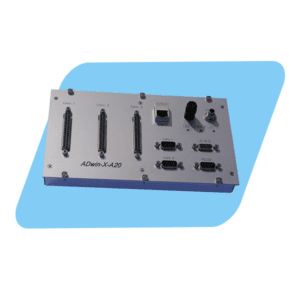ADwin X-A20 Accurately Measures Cyclical Stress Crack Growth
 Precise characterization of fatigue crack growth rate (FCGR) in metal samples subjected to repetitive cyclical stress is crucial for manufacturers of materials used in the aviation and aerospace industry, as well as designers and suppliers of aircraft and other types of vehicles. Conventional material test systems typically employ a closed-loop servo-hydraulic system to apply repetitive stress to the sample while monitoring the crack growth rate. Using several methods, manufacturers often encounter challenges when dealing with variable amplitude stress loading. Conventional closed-loop servo-hydraulic systems that rely on simple PID control become increasingly difficult to tune when employing variable amplitude stress loading. This is particularly true as the cycling frequency increases, exacerbating the dynamic limitations inherent in the servo-hydraulic system.
Precise characterization of fatigue crack growth rate (FCGR) in metal samples subjected to repetitive cyclical stress is crucial for manufacturers of materials used in the aviation and aerospace industry, as well as designers and suppliers of aircraft and other types of vehicles. Conventional material test systems typically employ a closed-loop servo-hydraulic system to apply repetitive stress to the sample while monitoring the crack growth rate. Using several methods, manufacturers often encounter challenges when dealing with variable amplitude stress loading. Conventional closed-loop servo-hydraulic systems that rely on simple PID control become increasingly difficult to tune when employing variable amplitude stress loading. This is particularly true as the cycling frequency increases, exacerbating the dynamic limitations inherent in the servo-hydraulic system.
Usage
An enhanced test system that employs an ADwin X-A20 real-time data acquisition and control system has been developed specifically to address these challenges. It provides a comprehensive solution for generating stress waveforms, acquiring data for force, displacement, and crack monitoring, and implementing a correction algorithm that dynamically adjusts the stimulus based on historical performance data. This approach ensures feedback errors remain below 0.1%, even in the presence of significant phase lag in the feedback signal.
 Key Features
Key Features
- Real-time control and data acquisition: The ADwin X-A20 system operates as a stand-alone real-time controller, independent of the connected Windows PC. This ensures continuous control and data collection even in the event of a PC crash.
- Adaptive control: The adaptive control capabilities of the ADwin system far surpass those of conventional analog or digital PID controllers, particularly when operating over a wide range of frequencies and loads.
- Precision crack monitoring: The system supports both compliance and DC voltage potential drop methods for monitoring crack length, ensuring accurate crack growth rate measurements.
- Flexible data acquisition and control parameters: The Windows application provides a user-friendly interface for configuring test parameters, acquiring and controlling data, displaying test status, visualizing force and displacement signals, and plotting crack growth rate versus cyclic stress intensity.
- Ethernet communication: The PC communicates with the ADwin system via a standard Ethernet interface, offering flexibility in system setup and integration.
Benefits
- Enhanced test accuracy: The use of the ADwin system provides more accurate, real-time control of sample loading during variable amplitude loading resulting
in more accurate test results compared to systems employing conventional PID controllers. - Superior adaptive control: The adaptive control capabilities of the ADwin system significantly outperform conventional analog or digital PID controllers, particularly when operating over a range of frequencies and loads.
- Stable and predictable operation: The ADwin system’s independent DSP processor ensures stable and predictable operation, independent of the Windows environment on the PC.
- Can be retrofitted to many common stress test frames and servo controllers from MTS and Instron.
Conclusion
The ADwin X-A20 real-time data acquisition and control system offers a powerful and versatile solution for precise fatigue crack growth rate measurement in metal samples subjected to variable amplitude stress loading. Its advanced control algorithms, real-time data acquisition capabilities, and flexible user interface make it an ideal tool for material testing in the aviation and aerospace industries.
For more information on the ADwin X-A20, or to find the ideal solution for your application-specific needs, contact a CAS DataLogger Application Specialist at (800) 956-4437 or request more information.

